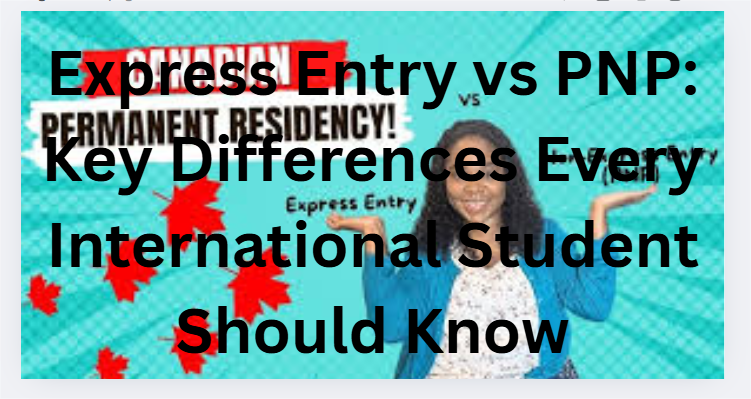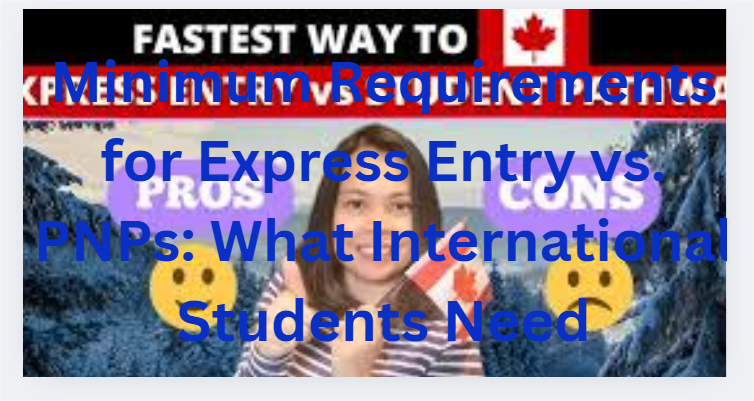Express Entry vs. Provincial Nominee Programs: Which Path Works Best With Scholarships?
July 20, 2025 | by eguideshub

Choosing between Express Entry and Provincial Nominee Programs (PNPs) is one of the biggest decisions for international students in Canada – and your scholarship could be the deciding factor. Here’s how to match your funding situation with the right immigration pathway for permanent residency.
The Scholarship Factor in Canada’s Immigration Routes
Your scholarship package impacts your immigration options in ways most students never consider:
For Express Entry:
- Living stipends reduce proof of funds requirements
- Research positions build Canadian work experience
- Financial stability allows focus on CRS score boosters
For PNPs:
- Some provinces prioritize scholarship recipients
- Local awards may align with provincial labor needs
- Campus connections lead to employer nominations
Head-to-Head Comparison
Processing Time
- Express Entry: 6-12 months after ITA
- PNPs: 12-24 months (varies by province)
Scholarship impact: Express Entry favors those with funds to wait, while PNPs work for students building local ties
Financial Requirements
- Express Entry: $13,757+ (single applicant)
- PNPs: Some require no proof of funds
Scholarship impact: Stipends help meet EE requirements, while PNP may need less
Work Experience Rules
- Express Entry: 1 year continuous skilled work
- PNPs: Some accept part-time or mixed experience
Scholarship impact: Research assistant hours often qualify for both
Smart Scholarship Strategies for Each Path
Maximizing Express Entry
- Use living allowances to satisfy settlement funds
- Convert research hours into Canadian experience
- Leverage financial freedom to improve language scores
Optimizing for PNPs
- Target province-specific scholarships (ex: BC Talent)
- Use campus networks for employer nominations
- Align research with provincial labor priorities
Real Student Outcomes
Case 1: The Express Entry Scholar
Priya’s $25,000 Ontario Graduate Scholarship provided:
- $12,000 living allowance (covered proof of funds)
- Paid lab position (qualified as skilled work)
- Time to achieve CLB 10 in English
Result: CRS 521 → PR in 5 months
Case 2: The PNP Pathway
Ahmed’s $15,000 Manitoba scholarship led to:
- Local industry connections
- Provincial priority nomination
- Lower financial requirements
Result: PR through MPNP in 16 months
Scholarship Red Flags to Watch
- Tuition-only awards – Don’t help with proof of funds
- Short-term funding – May leave gaps in financial proof
- Restrictive employment – Limits work experience options
Your Decision Checklist
Choose Express Entry if your scholarship:
✓ Includes substantial living funds
✓ Allows paid research/assistantships
✓ Gives time for language test prep
Consider PNPs if your scholarship:
✓ Comes from a province with friendly streams
✓ Connects you to local employers
✓ Aligns with regional labor needs
Hybrid Approach
Many successful applicants combine both:
- Enter Express Entry pool
- Apply for PNPs as backup
- Accept whichever comes first
Scholarship recipients often qualify for both simultaneously – your funding opens multiple doors.
Express Entry vs PNP: Key Differences Every International Student Should Know

As an international student in Canada, choosing between Express Entry and a Provincial Nominee Program (PNP) can significantly impact your path to permanent residency (PR). Here’s a clear breakdown of how they differ and which may be best for you.
1. What Are They?
Express Entry (EE)
- A federal immigration system for skilled workers
- Uses a points-based ranking system (CRS score)
- Three main programs:
- Canadian Experience Class (CEC) – Best for graduates with Canadian work experience
- Federal Skilled Worker (FSW) – For those with foreign work experience
- Federal Skilled Trades (FST) – For skilled tradespeople
Provincial Nominee Program (PNP)
- Run by individual provinces to meet local labor needs
- Requires a job offer or connection to the province
- Two pathways:
- Base Nomination (requires Express Entry profile)
- Enhanced Nomination (direct PR application without EE)
2. Key Differences at a Glance
| Factor | Express Entry | PNP |
|---|---|---|
| Processing Time | 6-8 months | 6-18 months (varies by province) |
| Job Offer Needed? | No (but helps) | Usually yes |
| CRS Score Needed | 500+ (varies per draw) | Lower (some PNPs accept 300-400 CRS) |
| Province-Specific? | No | Yes (must live/work in nominating province) |
| Best For | High-scoring candidates | Students with job offers in specific provinces |
3. Which One is Right for You?
Choose Express Entry If You…
✔ Have high CRS points (470+)
✔ Have Canadian work experience (CEC pathway)
✔ Want to live anywhere in Canada
✔ Prefer a faster process
Choose PNP If You…
✔ Have a job offer from a specific province
✔ Studied in a PNP-friendly province (e.g., Manitoba, Saskatchewan)
✔ Have lower CRS points (300-450)
✔ Are okay with staying in one province for a few years
4. Can You Use Both?
Yes! Many students combine both:
- Enter the Express Entry pool
- Apply for a PNP nomination (boosts CRS by 600 points)
- Receive an Invitation to Apply (ITA) for PR
Example:
- A student in Manitoba with a CRS of 420 may not get an EE invite.
- But if they get a Manitoba PNP nomination, their CRS jumps to 1020, guaranteeing PR.
Minimum Requirements for Express Entry vs. PNPs: What International Students Need

If you’re an international student in Canada planning to apply for permanent residency (PR), you’ll likely use either Express Entry or a Provincial Nominee Program (PNP). Each has different minimum requirements—here’s what you need to qualify.
1. Minimum Requirements for Express Entry
Express Entry manages three federal immigration programs, each with its own criteria:
A. Canadian Experience Class (CEC) – Best for Graduates
✔ 1 year of skilled work experience in Canada (NOC 0, A, or B)
✔ CLB 5 (NOC B jobs) or CLB 7 (NOC 0/A jobs) in English/French
✔ No minimum education, but higher education = more CRS points
✔ Must be in Canada legally (e.g., on a work or study permit)
B. Federal Skilled Worker (FSW) – For Foreign Experience
✔ 1 year of continuous skilled work experience (NOC 0, A, or B)
✔ CLB 7 in English/French (IELTS 6.0+ in all bands)
✔ Minimum 67/100 points (based on age, education, work experience, etc.)
✔ Proof of funds (unless you have a valid Canadian job offer)
C. Federal Skilled Trades (FST) – For Tradespeople
✔ 2 years of skilled trade experience (last 5 years)
✔ Valid job offer (1+ year) OR Canadian trade certificate
✔ CLB 5 (speaking/listening) & CLB 4 (reading/writing)
2. Minimum Requirements for PNPs
Each province sets its own rules, but most require:
✔ A job offer from an employer in the province (some exceptions for Master’s/PhD grads)
✔ Previous study/work in the province (varies by program)
✔ Language scores (usually CLB 4-7, depending on the job)
✔ Proof of funds (some provinces waive this if you have a job)
Popular PNP Streams for Students
| Province | Minimum Requirements |
|---|---|
| Ontario (OINP) | – Graduated from a Canadian institution – Job offer (NOC 0, A, B) or Master’s/PhD without job offer |
| BC (BC PNP) | – Job offer from a BC employer – CLB 4+ (for NOC C/D jobs) or CLB 7+ (for NOC 0/A/B) |
| Manitoba (MPNP) | – Studied in Manitoba – Job offer (NOC 0, A, B, C) – CLB 5+ |
| Saskatchewan (SINP) | – Job offer in an in-demand occupation – CLB 4+ |
Provincial Nominee Programs (PNPs) That Favor Scholarship Holders
Canada’s Provincial Nominee Programs (PNPs) offer special pathways for international students who have received scholarships—making it easier to transition from study to permanent residency (PR). Here are the best PNPs for scholarship recipients, along with key benefits and eligibility criteria.
1. Ontario Immigrant Nominee Program (OINP) – International Student Streams
Ontario prioritizes highly educated graduates, including scholarship winners.
Key Benefits for Scholarship Holders
✔ No job offer required for Master’s or PhD graduates
✔ Fast-track nomination for students from Ontario universities
✔ Scholarship history strengthens application (shows academic merit)
Eligible Programs
- Masters Graduate Stream
- PhD Graduate Stream
Best For: Students at University of Toronto, Waterloo, McMaster, Queen’s, etc.
2. British Columbia Provincial Nominee Program (BC PNP) – International Graduate Stream
BC favors scholarship recipients in high-demand fields like tech, healthcare, and sciences.
Key Benefits
✔ Priority processing for graduates with awards
✔ Tech Pilot Program (fast PR for tech-related degrees)
✔ Lower CRS requirement if nominated
Eligibility
- Job offer from a BC employer (NOC 0, A, or B)
- Degree/diploma from a BC institution
- Scholarship improves employer interest
Best For: Students at UBC, SFU, BCIT, UVic
3. Manitoba Provincial Nominee Program (MPNP) – International Education Stream
Manitoba actively recruits international students with scholarships.
Key Benefits
✔ No work experience required (if studied in Manitoba)
✔ Faster nomination (6 months processing)
✔ Scholarship recipients get employer preference
Eligibility
- Graduated from a Manitoba college/university
- Job offer in Manitoba (NOC 0, A, B, or C)
- Scholarship improves application strength
Best For: Students at University of Manitoba, University of Winnipeg, Red River College
Final Recommendation
Your ideal path depends on your specific scholarship terms and career goals. Express Entry offers speed for well-funded scholars, while PNPs provide alternatives for those building local roots.
The smartest students map their immigration strategy alongside their scholarship search – because the right funding package does more than pay tuition; it can determine your entire Canadian future.
Have a scholarship but unsure which path fits? Share your award details below and we’ll help analyze your best route to PR.
Frequent Ask Questions
Can I apply for both Express Entry and PNPs simultaneously?
Yes! In fact, we recommend it. Many students:
• Create an Express Entry profile first
• Then apply for PNPs as backup
• Accept whichever approval comes faster
Just ensure you meet all requirements for both pathways
How do I know if my scholarship qualifies for PNP advantages?
Check for these key indicators:
✓ Funded by the provincial government
✓ Aligned with provincial labor market needs
✓ Includes work placement in the province
✓ Offered at a public institution in the province
Which provinces give special consideration to scholarship recipients?
Currently these provinces favor scholarship students:
• British Columbia (BCPNP International Post-Graduate)
• Ontario (OINP Masters Graduate Stream)
• Saskatchewan (International Graduate Category)
• Nova Scotia (Experience: Express Entry)
RELATED POSTS
View all


